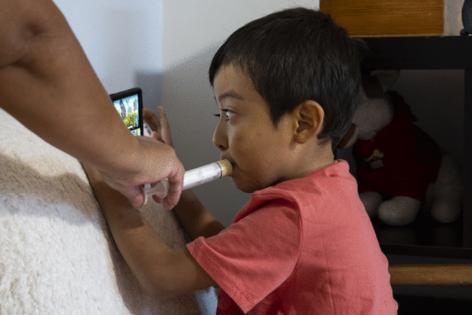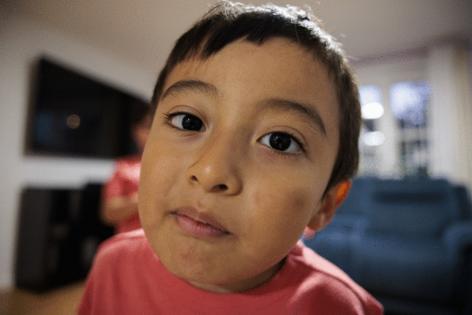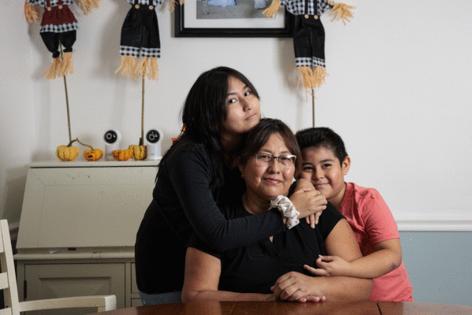He was caring for his 5-year-old son with brain cancer. Then he was detained by ICE
Published in News & Features
Every day at noon, no matter how busy he was at work, Johny Merida Aguilar left his construction job and hurried to Rhawnhurst School to feed his 5-year-old son, Jair.
The boy has brain cancer, in addition to autism and a severe eating disorder. He survives on PediaSure nutrition drink, delivered through a plastic syringe, and generally accepts food only from his father.
Now that daily feeding routine has been halted, leaving doctors and family members concerned for the child.
Merida Aguilar, who has lived in the United States without permission for nearly 20 years, was arrested by ICE for an immigration violation during a traffic stop last month on Roosevelt Boulevard near Hunting Park Avenue as he drove from a Home Depot store. He is confined at an ICE detention center in central Pennsylvania and has been ordered deported to his native Bolivia.
Merida Aguilar’s subsequent request to stay in the U.S. to care for Jair, a U.S. citizen ― and to continue as sole financial support for his wife and their two other citizen children ― has been denied by ICE.
David O’Neill, deputy director of the agency’s Philadelphia field office, wrote to the family’s attorney that after carefully reviewing the case, ICE concluded that “granting discretionary relief is not sufficiently warranted.”
Asked to explain the agency’s reasoning more fully, a spokesperson said in a statement that deportation operations focus on “enforcement that protects the homeland through the arrest and removal of those who undermine the safety of our communities and the integrity of our immigration laws.”
Immigration and Customs Enforcement makes custody and removal decisions on a case-by-case basis, following U.S. laws and Department of Homeland Security policies, the agency said, and its officers use “their experience as law-enforcement professionals and in a way that best protects the communities we serve.“
Jair’s parents fear that their youngest child could die — in this country, if left without the care and income of his father, or in Bolivia, where the U.S. State Department warns that “hospitals cannot handle serious conditions.”
In a phone interview from the Moshannon Valley Processing Center, Merida Aguilar, 48, described his worry for his family and for his son’s life.
“Even if we wanted to go back to Bolivia, there’s no hospital, the treatment is not adequate,” he said.
Philadelphia immigration attorney John Vandenberg, who represents the family, filed for relief in the U.S. Court of Appeals for the Third Circuit, which issued a Sept. 30 order to temporarily block Merida Aguilar’s deportation. A year ago, Vandenberg said, his request for a stay of removal would have been approved.
For decades, under both Republican and Democratic administrations, undocumented families with gravely ill children were commonly granted deferred action. That put their immigration cases on hold while their sons and daughters underwent medical treatment.
Elected officials from both parties recognized that care in the American health system was crucial to saving lives, and that sending sick children to less-developed nations could seal their fate.
President Donald Trump upended that in August 2019, during his first term in office, telling families that deferred-action applications were no longer being accepted. The administration subsequently reversed itself after an uproar from medical professionals, community advocates, and elected officials. Applications can still be made now.
Merida Aguilar’s request to ICE was somewhat different, since he sought a stay of removal and release from detention, as opposed to deferred action.
What the family needs to survive, said his wife, Gimena Morales Antezana, is his freedom, for the sake of Jair and for daughter Melany, 13, and son Matias, 7.
“Mercy, for Jair,” she said in an interview at the family’s Northeast Philadelphia home, “so he can have his dad.”
She has not told the youngest two children that their father is being held in detention, instead saying he is away for his job. The effects of his absence are evident, she said.
Straight-A student Matias has seen his grades drop. And Melany has had to take on roles beyond her age, including trying to get her youngest sibling to eat.
“Helping is hard,” the 13-year-old said. “I miss my dad a lot. I wish that he could be here to help me.”
Merida Aguilar and his wife were given permission to legally work in the U.S. under her 2024 claim for asylum, which could enable both to live here permanently if granted. The Trump administration, however, has made it increasingly difficult for people to succeed on those claims.
Morales Antezana, 49, had to stop working in 2020 to handle the nearly full-time demands of Jair’s health, taking him to see specialists and undergo treatments and therapies at Children’s Hospital of Philadelphia, and at the same time caring for Melany and Matias.
Jair completed his initial chemotherapy in August 2022, documents show, but the tumor grew back and he started oral chemotherapy in January 2024.
His autism has brought developmental delays, and his eating condition, called “avoidant-restrictive food intake disorder,” has left him dependent on PediaSure. He also suffers from scoliosis and from water on the brain that doctors have been unable to drain.
Malnutrition has been a constant battle.
Medical professionals and others who know the family wrote letters that Vandenberg shared with ICE, attesting to the father’s role in the family’s welfare.
“Jair’s father’s daily support in feeding his son is integral to his overall health,” wrote Cynthia Schmus, a neuro-oncology nurse practitioner at CHOP. “Without nutrition he is at risk of significant medical decline.”
Brenda Nogales Garcia, a HIAS Pennsylvania program manager who has worked with the family, wrote that “Johny and his wife did everything they could to ensure he was getting enough food, but it was a difficult task. Jair did not want to eat, and they could not force food into him because he would throw it up.”
Mariam Mahmud, a doctor with Peace Pediatrics Integrative Medicine in Doylestown, said she was concerned about the boy’s fate if the family must leave the U.S.
“Jair will not be able to obtain effective medical care in Bolivia,” she wrote.
The doctor cited a 2024 study in the Journal of Neuro-Oncology, which found an average survival time of 1.9 months for children with medulloblastoma at the Hospital del Niño in La Paz.
Jair has accepted less than 30% of his needed daily calories since his father has been detained, Mahmud wrote, and is at constant risk of hospitalization.
Vandenberg said Merida Aguilar has no criminal record in the U.S., and Bolivian authorities provided documentation showing he committed no offenses in that country.
But his efforts to stay here could be complicated by a previous deportation, when he gave a false name to federal immigration authorities while trying to enter the U.S. without permission.
In 2008, the Bolivian national provided a Mexican identification card with the name Juan Luna Gutierrez after being stopped by Customs and Border Protection as he attempted to cross the border east of San Diego.
Immigration officials took his fingerprints and sent him to Mexico, but Merida Aguilar secretly crossed back into the U.S. almost immediately.
Someone who reenters the U.S. after deportation can be charged with a felony, punishable by fines and prison time, but Merida Aguilar was never charged with that offense.
In the phone interview with The Inquirer, he said he came to the U.S. in hope of attaining a better life. His wife said the same, describing how they left Bolivia together to find jobs and send money home to their families.
Their son Jair was sick almost from the time he was born, they said. At one point the child’s eating difficulties became so pronounced that he required a feeding tube.
“Johny was the only one who could get him to eat,” Morales Antezana said. Because of that, she said, her husband made sure to be home for breakfast and dinner, as well as going to Jair’s school during the day.
He would entertain the boy with jokes and stories, she said, small distractions that made feeding easier.
“I know in my heart if we are sent back, that is the end of our fight. We are going to have to let go of his hand,” the child’s mother said. “Bolivia doesn’t have the kind of cancer treatment he needs. We won’t be able to keep fighting for his life.”
_____
©2025 The Philadelphia Inquirer. Visit inquirer.com. Distributed by Tribune Content Agency, LLC.












Comments